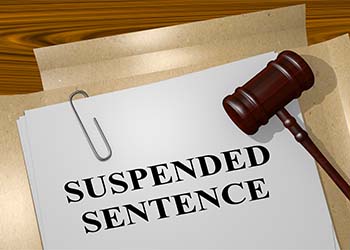What Is a Suspended Sentence?
Sept. 20, 2023
 Everyone who faces criminal charges wants to get the charges dismissed or, at the very least, stay out of jail or prison. When facing charges, you might want to review your alternative sentencing options with an experienced criminal defense attorney to have your best shot at avoiding time behind bars.
Everyone who faces criminal charges wants to get the charges dismissed or, at the very least, stay out of jail or prison. When facing charges, you might want to review your alternative sentencing options with an experienced criminal defense attorney to have your best shot at avoiding time behind bars.
With the help of an attorney, you may be able to pursue a suspended sentence, which allows you to remain in the community, keep your job, and care for your family. But what exactly is a suspended sentence and when is it available to defendants? We’re here to answer these questions and more.
At DaytonaDefense.com, we assist clients in addressing their sentencing options, including a suspended sentence, and taking the necessary steps to get a reduced sentence or avoid punishment. Our defense attorney has more than 25 years of legal experience and a reputation for being an aggressive advocate for clients in high-stakes legal battles. With a law office located in Daytona Beach, Florida, we also serve the surrounding area, including Palm Coast, DeLand, New Smyrna Beach, Port Orange, Flagler County, and Volusia County.
What Is a Suspended Sentence?
Many criminal convictions in the state of Florida carry jail or prison time as one of the penalties. However, judges in criminal courts have the discretion to choose alternative sentencing options, including a suspended sentence, to allow the convicted person to remain in the community and have a chance to rebuild his or her life.
Under the sentencing guidelines in Florida, judges can opt for a suspended sentence, also known as a suspended imposition of a sentence in the state. While this alternative sentencing option is not available to everyone, it can be beneficial for both the defendant and the criminal justice system because it helps prevent overcrowding in local jails and state prisons. However, the defendant is typically required to fulfill a number of obligations to stay out of jail/prison.
How Suspended Sentencing Works in Florida
A suspended sentence is becoming increasingly common in many jurisdictions in Florida, including Daytona Beach and other parts of Volusia County. Typically, a judge may suspend a sentence upon the convicted person’s successful completion of a set period of probation. While on probation, the convicted individual must fulfill certain conditions, such as:
Reporting to a probation officer.
Refraining from using drugs and alcohol.
Submitting to random drug/alcohol testing.
Completing substance abuse treatment.
Serving community service hours.
Remaining within a specific geographical area (e.g., not leaving the county or state).
Not contacting certain people.
Maintaining employment or finding a job (if unemployed).
Not possessing firearms.
The conditions of probation vary from one case to another depending on the defendant’s criminal history, the nature and severity of the criminal offense, and other factors.
Eligibility for a Suspended Sentence
Defendants are not entitled to a suspended sentence. Instead, courts in Florida consider a suspended sentence a privilege that must be earned. For this reason, not everyone is eligible to have their sentence suspended in the state of Florida. Factors considered when determining the defendant’s eligibility for this sentencing option include but are not limited to:
The defendant’s criminal record.
The likelihood that the defendant will recommit the same crime or commit new crimes.
The defendant’s willingness to change their behavior.
Whether or not the defendant poses a risk to the public if they remain in the community.
Judges in Florida have broad discretion in deciding whether to suspend a sentence and can suspend both a misdemeanor jail sentence and a felony prison sentence, even though felonies are usually punished more harshly than misdemeanors.
In felony cases, the convicted person may be ordered to serve some time in prison before they are placed on probation and their remaining sentence is suspended. Judges are usually more likely to impose a suspended sentence as part of a plea bargain. However, it is never a good idea to accept any plea deals until you speak with an attorney to understand the legal options available to you.
A suspended sentence is typically not an option when the statutes provide a mandatory minimum jail/prison sentence for specific crimes. While judges do not have the authority to ignore the sentencing guidelines that prescribe mandatory minimum sentences, they may have broad discretion when statutes do not provide mandatory sentences.
Probation and Suspended Sentencing
Probation and a suspended sentence are not the same thing, even though these two processes are very closely correlated. A suspended sentence is a type of sentence, while probation serves as an alternative to jail or prison time.
When the offense is minor, a judge may decide to suspend the convicted person’s sentence without probation. Even though the defendant will not be sent to jail or prison, the conviction will still appear on their criminal record. However, if the person violates the terms of their probation, a suspended sentence can be revoked. As a result, the defendant may be required to serve the remainder of their sentence in jail or prison.
Explore Your Options With a Daytona Defense Attorney
Sentencing varies from one case to another. Depending on the facts of your case, a suspended sentence may be a viable option. Reach out to our defense attorney at DaytonaDefense.com to discuss your particular case and explore your alternative sentencing options. We will fight vigorously to secure the best possible outcome in your case and keep you out of jail/prison. Schedule a free consultation today to discuss the details of your case.
